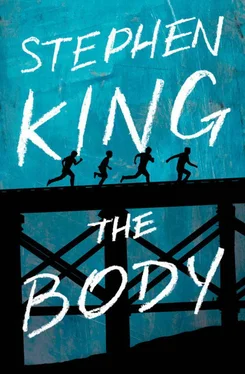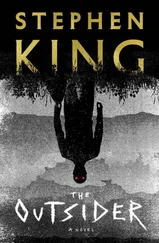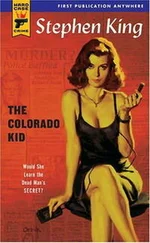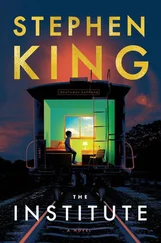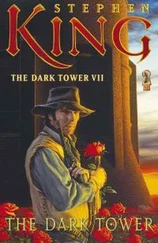Billy and Charlie had managed to keep their enormous secret for just about thirty-six hours. Then Charlie spilled it to Ace while they were shooting pool, and Billy had spilled it to Jack Mudgett while they were fishing for steelies from the Boom Road Bridge. Both Ace and Jack had sworn solemnly on their mothers’ names to keep the secret, and that was how everybody in their gang knew about it by noon. Guess you could tell what those assholes thought about their mothers.
They all congregated down at the pool hall, and Fuzzy Bracowicz advanced a theory (which you have heard before, Gentle Reader) that they could all become heroes—not to mention instant radio and TV personalities—by “discovering” the body. All they had to do, Fuzzy maintained, was to take two cars with a lot of fishing gear in the trunks. After they found the body, their story would be a hundred per cent. We was just plannin to take a few pickerel out of the Royal River, officer. Heh-heh-heh. Look what we found.
They were burning up the road from Castle Rock to the Back Harlow area just as we started to finally get close.
Clouds began to build in the sky around two o’clock, but at first none of us took them seriously. It hadn’t rained since the early days of July, so why should it rain now? But they kept building to the south of us, up and up and up, thunderheads in great pillars as purple as bruises, and they began to move slowly our way. I looked at them closely, checking for that membrane beneath that means it’s already raining twenty miles away, or fifty. But there was no rain yet. The clouds were still just building.
Vern got a blister on his heel and we stopped and rested while he packed the back of his left sneaker with moss stripped from the bark of an old oak tree.
“Is it gonna rain, Gordie?” Teddy asked.
“I think so.”
“Pisser!” he said, and sighed. “The pisser good end to a pisser good day.”
I laughed and he tipped me a wink.
We started to walk again, a little more slowly now out of respect for Vern’s hurt foot. And in the hour between two and three, the quality of the day’s light began to change, and we knew for sure that rain was coming. It was just as hot as ever, and even more humid, but we knew. And the birds did. They seemed to appear from nowhere and swoop across the sky, chattering and crying shrilly to each other. And the light. From a steady, beating brightness it seemed to evolve into something filtered, almost pearly. Our shadows, which had begun to grow long again, also grew fuzzy and ill-defined. The sun had begun to sail in and out through the thickening decks of clouds, and the southern sky had gone a coppery shade. We watched the thunderheads lumber closer, fascinated by their size and their mute threat. Every now and then it seemed that a giant flashbulb had gone off inside one of them, turning their purplish, bruised color momentarily to a light gray. I saw a jagged fork of lightning lick down from the underside of the closest. It was bright enough to print a blue tattoo on my retinas. It was followed by a long, shaking blast of thunder.
We did a little bitching about how we were going to get caught out in the rain, but only because it was the expected thing—of course we were all looking forward to it. It would be cold and refreshing… and leech-free.
At a little past three-thirty, we saw running water through a break in the trees.
“That’s it!” Chris yelled jubilantly. “That’s the Royal!”
We began to walk faster, taking our second wind. The storm was getting close now. The air began to stir, and it seemed that the temperature dropped ten degrees in a space of seconds. I looked down and saw that my shadow had disappeared entirely.
We were walking in pairs again, each two watching a side of the railroad embankment. My mouth was dry, throbbing with a sickish tension. The sun sailed behind another cloudbank and this time it didn’t come back out. For a moment the bank’s edges were embroidered with gold, like a cloud in an Old Testament Bible illustration, and then the wine-colored, dragging belly of the thunderhead blotted out all traces of the sun. The day became gloomy—the clouds were rapidly eating up the last of the blue. We could smell the river so clearly that we might have been horses—or perhaps it was the smell of rain impending in the air as well. There was an ocean above us, held in by a thin sac that might rupture and let down a flood at any second.
I kept trying to look into the underbrush, but my eyes were continually drawn back to that turbulent, racing sky; in its deepening colors you could read whatever doom you liked: water, fire, wind, hail. The cool breeze became more insistent, hissing in the firs. A sudden impossible bolt of lightning flashed down, seemingly from directly overhead, making me cry out and clap my hands to my eyes. God had taken my picture, a little kid with his shirt tied around his waist, duck-bumps on his bare chest and cinders on his cheeks. I heard the rending fall of some big tree not sixty yards away. The crack of thunder which followed made me cringe. I wanted to be at home reading a good book in a safe place… like down in the potato cellar.
“Jeezis!” Vern screamed in a high, fainting voice. “Oh my Jeezis Chrise, lookit that !”
I looked in the direction Vern was pointing and saw a blue-white fireball bowling its way up the lefthand rail of the GS&WM tracks, crackling and hissing for all the world like a scalded cat. It hurried past us as we turned to watch it go, dumbfounded, aware for the first time that such things could exist. Twenty feet beyond us it made a sudden— pop!! —and just disappeared, leaving a greasy smell of ozone behind.
“What am I doin here, anyway?” Teddy muttered.
“What a pisser!” Chris exclaimed happily, his face upturned. “This is gonna be a pisser like you wouldn’t believe !” But I was with Teddy. Looking up at that sky gave me a dismaying sense of vertigo. It was more like looking into some deeply mysterious marbled gorge. Another lightning-bolt crashed down, making us duck. This time the ozone smell was hotter, more urgent. The following clap of thunder came with no perceptible pause at all.
My ears were still ringing from it when Vern began to screech triumphantly: “THERE! THERE HE IS! RIGHT THERE! I SEE HIM!”
I can see Vern right this minute, if I want to—all I have to do is sit back for a minute and close my eyes. He’s standing there on the lefthand rail like an explorer on the prow of his ship, one hand shielding his eyes from the silver stroke of lightning that has just come down, the other extended and pointing.
We ran up beside him and looked. I was thinking to myself: Vern’s imagination just ran away with him, that’s all. The suckers, the heat, now this storm… his eyes are dealing wild cards, that’s all. But that wasn’t what it was, although there was a split second when I wanted it to be. In that split second I knew I never wanted to see a corpse, not even a runover woodchuck.
In the place where we were standing, early spring rains had washed part of the embankment away, leaving a gravelly, uncertain four-foot drop-off. The railroad maintenance crews had either not yet gotten around to it in their yellow diesel-operated repair carts, or it had happened so recently it hadn’t yet been reported. At the bottom of this washout was a marshy, mucky tangle of undergrowth that smelled bad. And sticking out of a wild clockspring of blackberry brambles was a single pale white hand.
Did any of us breathe? I didn’t.
The breeze was now a wind—harsh and jerky, coming at us from no particular direction, jumping and whirling, slapping at our sweaty skins and open pores. I hardly noticed. I think part of my mind was waiting for Teddy to cry out Paratroops over the side!, and I thought if he did that I might just go crazy. It would have been better to see the whole body, all at once, but instead there was only that limp outstretched hand, horribly white, the fingers limply splayed, like the hand of a drowned boy. It told us the truth of the whole matter. It explained every graveyard in the world. The image of that hand came back to me every time I heard or read of an atrocity. Somewhere, attached to that hand, was the rest of Ray Brower.
Читать дальше
